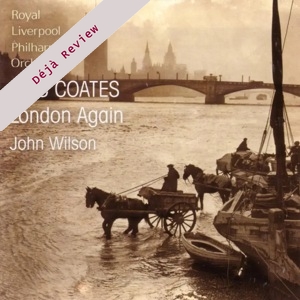
Déjà Review: this review was first published in May 2005 and the recording is still available.
Eric Coates (1886-1957)
Concert waltz: Footlights (1939)
The Three Men Suite (1935)
The Selfish Giant (1925)
London Again Suite for Orchestra (1936)
Cinderella – A Phantasy (1929)
Summer Days Suite (1919)
Television March (1946)
Royal Liverpool Philharmonic Orchestra/John Wilson
rec. 2003, Philharmonic Hall, Liverpool, UK
Avie AV2070 [79]
“Eric Coates’ … music crackled with enthusiasm and vitality … a man would have to have a wooden heart not to respond to the music of Eric Coates” (Sir Charles Groves)
With this new Avie release, John Wilson makes a welcome return to the music of Eric Coates after his two acclaimed recordings made with the BBC Concert Orchestra for ASV in 1996 (CD WHL 2107) and 1998 (CD WHL 2112). I remember writing my reviews then and, in common with a number of others, including the The Times reviewer, noted that Wilson had a magical empathy with the world and music of Coates. His readings then and now could compare with those of the composer himself and with those of the late Stanford Robinson. Now Wilson returns to conduct the Royal Liverpool Philharmonic Orchestra in another Coates programme full of happy nostalgia and joie de vivre. Incidentally, this same orchestra was conducted, in very much the same repertoire, by Sir Charles Groves for a series of EMI Classics recordings made in the late 1960s and early 1970s in remarkably good sound.
John Wilson has specialised in the music of Eric Coates and has been responsible for the archiving of the composer’s work in London’s Royal College of Music. In the course of his work, Wilson came across an unpublished Coates work that had been ‘lost’. It was, a ballet sketch, Coquette, that was performed and recorded for the first time on ASV CD WHL 2107.
But to this new recording … and how delightful it is! I was particularly elated with Wilson’s unashamedly romantic and unaffected readings of Coates’s more romantic and nostalgic writing. Wilson really wrings the heartstrings and brings a lump to the throat. Take his meltingly beautiful treatment of that gorgeous tenderly romantic tune for the opening of ‘The man about town’ from the Three Men Suite with its infectious toe-tapping ‘between-the-wars’ jazz reprise. Then there is that other lovely nostalgic evocation, ‘Langham Place’, Eric’s elegiac tribute to the BBC which had used so much of his music to introduce their radio and television programmes.
Coates’s marches were justly famous and immensely popular. Wilson realises all their ebullient swagger. From the London Again Suite there is ‘Oxford Street’ with tunes that easily rival the perhaps better known ‘Knightsbridge’ March from the earlier London Suite. And I was delighted that Wilson had chosen to include one of the less familiar marches, and one of my favourites, the stirring Television March composed for the resumption of TV broadcasting on June 8th 1946 after the privations of World War II.
Dance music was a favourite Coates musical form and the waltz one of his favoured dance rhythms. They abound in this album in memorable tunefulness – from the lilting charm of ‘At the Dance’ from the early Summer Days Suite to the glitter and sophistication of ‘Mayfair’, the London Again waltz, and the sweep and glamour of the Concert Valse, Footlights.
Those that disparage light music and Coates’s work in particular, might like to examine the composer’s Cinderella for this extended piece, some 16 minutes long, is really a tone poem relating the fairy story with great wit and style. Coates begins by suggesting, with a solo clarinet and hesitant, quivering strings, the beauty and essential goodness and humility of Cinderella. This is writing quite removed from the norm of light music. Grotesque sardonic material suggests the excitement of the ugly sisters preparing for the ball. You hear Cinderella’s sighs that she will be unable to go herself. Later, a series of waltzes delineates the progress of the story at the ball: a tender waltz for the romantic meeting between Prince Charming and Cinderella and a glamorous excited waltz for their ecstatic dancing, before twelve tam-tam crashes signal both midnight and the end of Cinderella’s golden dream. Eric Coates and John Wilson make Cinderella’s dejection and despair quite palpable in the work’s most touching episode. But hilarity follows as Coates has the Ugly Sisters trying on the glass slipper before the romantic conclusion..
The Selfish Giant, another of Eric Coates phantasies, is based on the Oscar Wilde story of a lonely giant whose garden is in perpetual winter. It is only when he opens his heart and lets the children in to play that Spring can enter. Again Coates’ music is magical in its colour and characterisation and, of course, wonderfully melodious.
Sweet tuneful nostalgic delight – a must for Eric Coates admirers.
Ian Lace
If you purchase this recording using a link below, it generates revenue for MWI and helps us maintain free access to the site



















